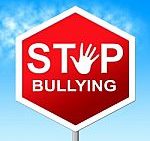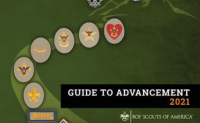 We usually think of bullying as taking place between youth. Whether they lack the filter of age and experience or just don’t know that it’s wrong, young people – particularly teenagers – can be genuinely mean-spirited at times.
We usually think of bullying as taking place between youth. Whether they lack the filter of age and experience or just don’t know that it’s wrong, young people – particularly teenagers – can be genuinely mean-spirited at times.
But it’s not just young people. One of my readers wrote to me a few weeks ago to relate a situation in his troop where the Scoutmaster was, in his description, verbally and mentally abusive to Scouts in the troop. He didn’t go into specific detail but from the circumstances surrounding the incidents, one could describe the behavior of the Scoutmaster as bullying.
After making progress toward greater awareness of bullying and its effects and consequences, it seems like the discourse is becoming less civilized. A recent story in the Washington Post detailed instances of bullying in school by some as young as six years old and attributes much of it to the frequent rhetoric of, incredibly, the president of the United States – who is also the honorary president of the Boy Scouts of America. Among them:
- A smart, sweet sixth-grader of mixed race in Ohio was surrounded at her middle school by a group of boys who locked arms and told her that they were “the wall” and that all black people should die.
- At another middle school in Tennessee, a group of boys locked arms, forming a human chain to prevent black students from passing, likening it to a border wall.
- Hateful graffiti, including Nazi symbols, were painted on school property in Ohio and many other places.
- There’s video of groups of students at high school football games in Utah and Washington and at a middle school cafeteria in my neighboring town of Royal Oak, Michigan, chanting “Build the wall” or unfurling a “Make America Great Again” flag.
- And at an elementary school in Utah, parents observed two kindergartners (kindergartners!) telling a Latino boy that the president would send him back to Mexico.
Certainly there has long been a racist and xenophobic undercurrent flowing in our society but recent political events have brought it to the surface in alarming ways. In a quiet residential town also close to my Michigan home, a Latino friend of ours, a successful restaurateur and businessman, was participating in a community forum on diversity, equity and inclusion. As he described the bullying and racial slurs experienced by his teenage son, he was confronted by a man who asked him “why didn’t you stay in Mexico?” Â In a turn of good faith, the man was instantly condemned by the others at the meeting, and his own son even disowned his father’s remarks on social media.
Despite our society’s efforts to quell it, bullying is still ever present. All too often, the target – or the perpetrators – are teenage and pre-teen youth, which also happens to be Scouting’s core demographic. As Scouters, we are in a unique position to do something about it, and it starts with you. The Boy Scouts of America takes a strong stand against bullying at all levels in our program and encourages society to follow suit. There is an extensive set of resources for combating bullying. Our child abuse prevention materials for Cub Scouts and ScoutsBSA help our youth members recognize and resist such behavior. And the latest Youth Protection Training, required of all adult volunteers and strongly recommended for all parents of Scout-age youth, devotes nearly a quarter of the course to recognizing and preventing bullying.
As a Scouting volunteer, you are on the front lines of this battle. We are working hard to eliminate bullying, both by youth and by adults. We strive to model good behavior and respectful relationships. We encourage and recognize youth when they treat others with compassion and civility, and gently correct those whose behavior toward others can cause hurt. It’s right there in the Scout Law:Â A Scout is kind.Â
Image: Stuart Miles / freedigitalphotos.net
This post first appeared on Bobwhite Blather.





One of my cardinal rules of scouting is to keep politics out of it. In the same way I would never bring a politically charged editorial into a den meeting or a troop meeting as a topic for discussion – nor would I do the same to a gathering of adult scout leaders.
Bullying is a serious issue, but using the topic to bring politics into scouting it is inexcusable.
You should be ashamed of yourself.
Politics is not the issue here. Bullying is, and when the honorary president of our organization does it so flagrantly and inspires others to do the same, it transcends politics. I’m not the one who should be ashamed.
As a rule I avoid both the discussion and inferential references to politics with Scouts, parents, and Scouters. Regardless of thoughts and opinions of our honorary organizational head (and actual POTUS) it’s safe to assume that a reasonable proportion of our parents and Scouters voted for him and will do so again. My own worldview and politics notwithstanding I can think of no better way to alienate people than to inject personal politics into a discussion. The roots of bad behavior reside with the Scouts and parents and will manifest regardless. Let’s “Do Our Best” to revive the art of polite conversation and discourse. While my personal politics are probably not hard to ascertain I think it is important to convey respect for the office and responsibilities of our leaders at various levels. Respecting the individuals who hold them is a matter of personal, and hopefully private, opinion…at least as regards Scouting.
Again, it’s not about politics but rather about the elements in our society that lead our young people to think it’s acceptable to bully others. We have a harder job to do to convince our Scouts to be Kind in the face of such pressures. And while our youth members are much less likely to bully others, they may find themselves victims of bullying by others who don’t embody the values of the Scout Oath and Scout Law.